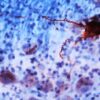A collective effort between European universities has described how dopamine D2 receptors in the cerebellum regulate social behaviors. The journal report is published in Nature Neuroscience.
Researchers tested mouse models and genetic tools to demonstrate changes in D2R levels in Purkinje cells that modifies sociability without impacting motor functions.
“By combining cell-type-specific transcriptomics, histological analyses, three-dimensional imaging and patch-clamp recordings, we demonstrate that cerebellar dopamine D2 receptors (D2Rs) in mice are preferentially expressed in Purkinje cells (PCs) and regulate synaptic efficacy onto PCs,” the study reads.
“Moreover, we found that changes in D2R levels in PCs of male mice during adulthood alter sociability and preference for social novelty without affecting motor functions.”
The findings concluded: “Altogether, these findings demonstrate novel roles for D2R in PC function and causally link cerebellar D2R levels of expression to social behaviors.”
The study was published June 16, 2022.


